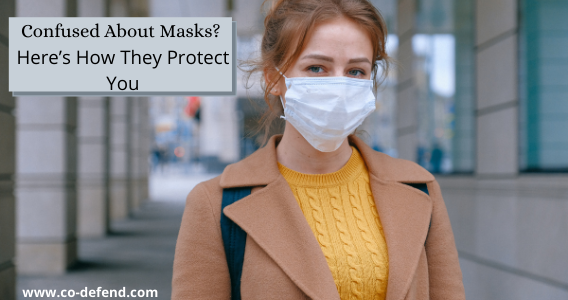As COVID-19 spreads rapidly across the U.S., most of us remain vulnerable to the virus. As of September 2020, the vast majority of Americans did not have antibodies against the coronavirus, according to a new study published in JAMA Internal Medicine. Worse yet, the percentage of people with antibodies was often the lowest in older age groups. That means mask-wearing, handwashing, and social distancing need to continue religiously for some time now.
In this blog, we will discuss the role of face masks in protecting us from the virus. The use of face masks has been repeatedly encouraged by the Centers for Disease Control and Prevention and the members of the federal coronavirus task force. But choosing the right face masks — and bulk PPE suppliers in the USA —could be perplexing at times. Read on to know how the face coverings dramatically improve your safety and which mask to wear.
Main Types of Masks
The FDA classifies face masks into two broad types: surgical masks and N95 respirators. Face mask manufacturers must test both masks for fluid resistance.
N95 respirators are tightly fitted and are likely to resist breathing if you wear it for a prolonged time. However, N95 masks provide the highest level of safety against the coronavirus. They prevent even the trinities virus particles from entering your respiratory tract.
Surgical masks are disposable. Along with other types of cloth face coverings, they belong to the loosely fitting face masks. Hence, with surgical masks, it’s highly unlikely that you’d face any breathing difficulty. These types of face coverings are porous, allowing the air to flow in and out. So, surgical and cloth face masks permit normal respiratory functions even if you wear them for a prolonged time.
What Type Should You Wear?
The most crucial factor in choosing the right face mask is how it can protect you from respiratory droplets. Besides, the face masks also prevent the wearer’s respiratory droplets from spreading. HEPA masks block respiratory particles more efficiently if the mask tightly fits onto your face. But, as mentioned earlier, they could also hamper your breathing. Masks with HEPA filters, such as N95 and KF95, could be uncomfortable for some wearers.
Surgical face masks are pleated rectangular multi-layer masks. They, too, can efficiently prevent respiratory droplets, protecting you from viral particles. In general, surgical masks best suit people trying to prevent droplet transmission. If any of N95 or surgical masks are not available, a cloth face mask could be the last resort.
Controlling Community Spread
“The more people who wear a mask, the more the community is protected and therefore the more you individually benefit,” said Dr. John Brooks, the chief medical officer of the CDC’s COVID-19 response program. Dr. Brooks proposed that increasing the percentage of people who wear a mask by 15% could prevent the need for lockdowns and reduce economic losses.
Experts across the world believe that the effectiveness of facial covering depends greatly on the type. The gold standard is, obviously, N95 respirators. As the name suggests, N95s can bloc up to 95% of particles a wearer might breathe in or out.
Scientists, however, argue that only health care workers require gold-standard protection. The shortage of N95 respirators has been a persisting issue in the U.S. and elsewhere throughout the pandemic. Early in the pandemic, N95 masks suppliers in the USA scaled up operations to meet soaring demands. Yet, the shortage has prevailed due to varying factors.
Surgical and cloth face masks are also highly effective in filtering harmful particles. An average person is much less exposed to viral particles. Hence good-quality surgical masks and well-made cloth face covering can also protect you from the virus.
Protecting the Wearer
There’s growing evidence that all kinds of face masks protect the wearer, as well. N95 masks are believed to be the most effective type in this context, followed by surgical masks. However, wearers’ benefit from cloth face covering is scarce.
In one study, a mask made of four layers of tightly woven surgical gauze more effectively prevented transmission. The study was conducted on both the wearer and the other party when both wear a mask. Hence, when you wear a mask, you are protecting yourself as well as others.
Busting Hypoxia Misinformation
Do face masks cause hypoxia? The short answer is no. A reduced level of oxygen intake may lead to hypoxia, a physiological condition where the oxygen supply in tissues is insufficient.
A healthy oxygen intake level in your body ranges from 95 to 100%. Anything below 90% is usually considered low. Physicians and respiratory health experts suggest that a mask is unlikely to cause hypoxia.
Wrapping up
As you may have understood by now that both N95s and surgical masks can protect us from the coronavirus. And this protection covers both the wearer and others. Surgical masks are porous and allow normal respiratory function. Cloth face coverings are even more porous and comparatively less protective. N95 respirators, the gold standard, usually recommended for health workers.
All experts, however, emphasize that masks alone are not enough to stop the spread. Social distancing, handwashing, and ventilation are equally crucial measures. Co-Defend, one of the leading bulk PPE suppliers in the USA, offers an array of COVID protection products, including surgical masks, gloves, and hand sanitizers. You can choose from a diverse range of PPE and order online at www.co-defend.com.
